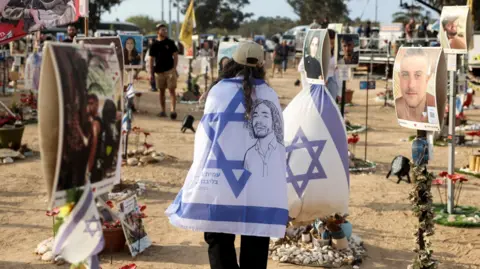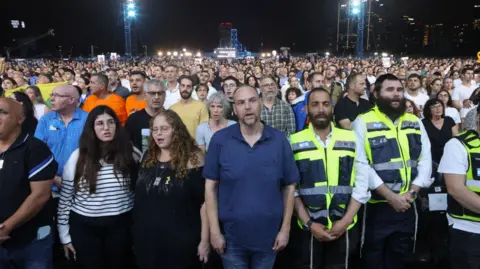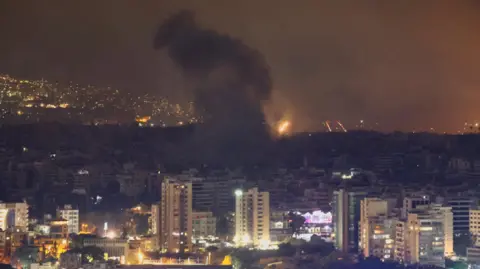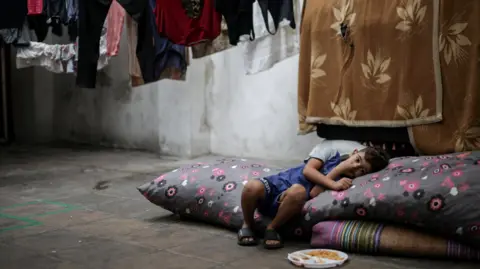Israel marks year since Hamas attack as fighting rages on multiple fronts

KATHMANDU: Israel has held ceremonies to remember the victims of the mass killings and abductions carried out by Hamas on 7 October 2023, against a backdrop of continuing fighting in the Gaza Strip and Lebanon.
A year on from the attack – that saw some 1,200 people killed and 251 taken hostage – Israeli PM Benjamin Netanyahu vowed to stop such an assault happening again, saying Israel’s armed forces were “changing the security reality” of the region.
Since 7 October, nearly 42,000 people have been killed during Israel’s offensive in Gaza, according to the Hamas-run health ministry.
As the day of commemorations unfolded, Israel said it had intercepted more than 100 rockets fired by Hezbollah in Lebanon as well as projectiles launched by Yemen’s Houthis and from Hamas in Gaza.
Last October, gunmen from Hamas in Gaza broke through the border fence and rampaged through nearby Israeli villages, Kibbutzim, military posts and the Nova music festival.
On Monday, families of the hundreds killed and dozens of people taken hostage at the festival gathered at the site early for the first memorial event of the day.
Holding pictures of loved ones they listened to the last track played at the festival before Israeli President Isaac Herzog led a minute’s silence at 06:29, the moment that the attack began.


In nearby communities also attacked by Hamas gunmen, smaller events were held.
Elsewhere, Netanyahu visited the Iron Sword memorial in Jerusalem for victims of the Hamas attacks, lighting a candle to “remember our fallen, our hostages”.
In Tel Aviv’s biggest park, Israeli families gathered for an event billed as the Bereaved Families Memorial Ceremony, which served as an alternative to the official government memorial ceremony.
Some of Israel’s most popular singers gave emotional performances, while images of victims flashed on the screens.
The stage was adorned with items symbolising the attacks including burnt and broken cars from the Nova music festival, and a child’s bicycle and swing set from the Be’eri kibbutz.
Outside Israel, US President Joe Biden joined other world leaders in condemning what the “unspeakable brutality” of the Hamas attacks a year ago.
He also expressed horror at the subsequent war, saying “far too many civilians had suffered, far too much”.
Mourners also gathered at vigils around the world including in Australia, South Africa, Germany and the US.
In the UK, Sir Keir Starmer told the House of Commons he supported Israel’s right to defend itself. But Britain’s prime minister insisted there was no military solution to the current crisis and appealed for all sides to “step back”.

However as the memorial services took place, the wider conflict in the region raged.
The Israeli military said Hezbollah had fired more than 130 rockets across the border from Lebanon. Most were shot down, but some hit the cities of Haifa and Tiberius.
Earlier Hamas also launched rockets at Tel Aviv from Gaza. The army said ballistic missiles had been fired at Israel from Yemen but had been intercepted.
Through the day, Israel carried out multiple air strikes and several ground incursions in Lebanon.
The Israeli military said it was expanding operations against Hezbollah, warning residents in southern Lebanon to avoid using boats in the sea or rivers south of the Awali river.

Three weeks of intense Israeli strikes and other attacks in Lebanon have killed more than 1,400 people, and displaced another 1.2 million, according to Lebanese authorities.
Hezbollah – a Shia Islamist political, military and social organisation that wields considerable power in Lebanon – has remained defiant despite suffering a series of devastating blows in recent weeks, including the killing of its leader and most of its top military commanders.
On Monday, the group insisted it was “confident… in the ability of our resistance to oppose the Israeli aggression”.
Israel’s government – which designates Hezbollah as a terrorist organisation – has pledged to make it safe for tens of thousands of displaced residents to return to their homes near the Lebanese border after a year of cross-border fighting sparked by the Gaza war.
The hostilities have escalated steadily since Hezbollah began firing rockets into northern Israel on 8 October 2023, the day after its ally Hamas deadly attack on southern Israel.
-BBC









